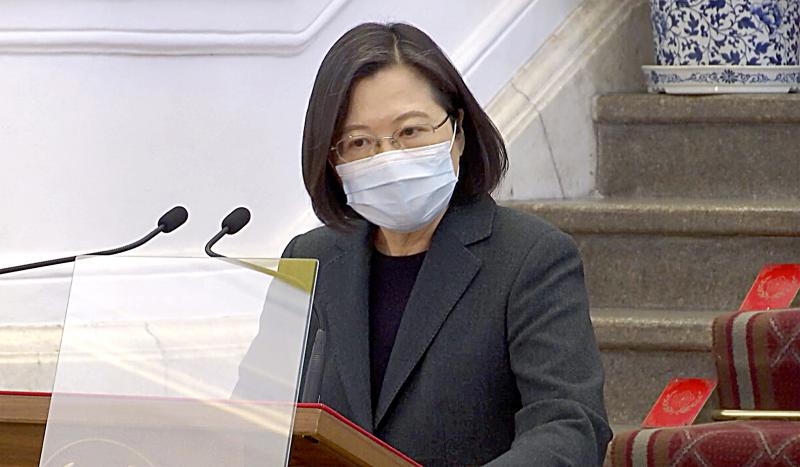The key to maintaining peace across the Taiwan Strait lies in the hands of China, while reiterating her administration’s willingness to engage in “meaningful dialogue” with Beijing on equal terms, President Tsai Ing-wen (蔡英文) said yesterday.
Commenting on cross-strait relations during a national security meeting at the Presidential Office in Taipei, Tsai said Taipei is always willing to push for meaningful cross-strait dialogue on the basis of equal footing “as long as Beijing is willing to resolve antagonisms.”
Taiwan also hopes that once the COVID-19 pandemic is properly contained, people on both sides of the Strait can resume normal exchanges, she said in a press release issued by the Presidential Office.

Photo: AP
However, maintaining cross-strait peace is not the responsibility of Taiwan alone, as “the key also lies in the hands of China,” she said.
“History has shown that flexing military muscles toward Taiwan will do little to help improve cross-strait relations,” she said, referring to China’s continuous deployment of military aircraft in Taiwan’s air defense identification zone and across the median line of the Taiwan Strait.
As the Chinese-speaking world is about to celebrate the annual Lunar New Year holiday, Tsai also wished Chinese citizens a happy new year, while calling on both sides to jointly promote cross-strait peace and stability.
Taiwan’s relations with its most important ally, the US, have remained solid despite the change in US administrations last month, she said.
Her national security team will be working closely with US President Joe Biden’s administration to enhance bilateral exchanges on various fronts, especially on trade, she said.
Beijing has taken a hardline stance on cross-strait relations and cut off dialogue with Taiwan since Tsai took office in May 2016 and refused to accept the so-called “1992 consensus.”
The “1992 consensus” — a term that former Mainland Affairs Council chairman Su Chi (蘇起) in 2006 admitted making up in 2000 — refers to a tacit understanding between the Chinese Nationalist Party (KMT) and the Chinese Communist Party that both sides of the Strait acknowledge that there is “one China,” with each side having its own interpretation of what “China” means.
However, the Democratic Progressive Party has contended that the consensus is “a mere illusion” because China does not recognize the idea that each side is free to interpret “one China” as it sees fit.

A Chinese aircraft carrier group entered Japan’s economic waters over the weekend, before exiting to conduct drills involving fighter jets, the Japanese Ministry of Defense said yesterday. The Liaoning aircraft carrier, two missile destroyers and one fast combat supply ship sailed about 300km southwest of Japan’s easternmost island of Minamitori on Saturday, a ministry statement said. It was the first time a Chinese aircraft carrier had entered that part of Japan’s exclusive economic zone (EEZ), a ministry spokesman said. “We think the Chinese military is trying to improve its operational capability and ability to conduct operations in distant areas,” the spokesman said. China’s growing

Nine retired generals from Taiwan, Japan and the US have been invited to participate in a tabletop exercise hosted by the Taipei School of Economics and Political Science Foundation tomorrow and Wednesday that simulates a potential Chinese invasion of Taiwan in 2030, the foundation said yesterday. The five retired Taiwanese generals would include retired admiral Lee Hsi-min (李喜明), joined by retired US Navy admiral Michael Mullen and former chief of staff of the Japan Self-Defense Forces general Shigeru Iwasaki, it said. The simulation aims to offer strategic insights into regional security and peace in the Taiwan Strait, it added. Foundation chair Huang Huang-hsiung

PUBLIC WARNING: The two students had been tricked into going to Hong Kong for a ‘high-paying’ job, which sent them to a scam center in Cambodia Police warned the public not to trust job advertisements touting high pay abroad following the return of two college students over the weekend who had been trafficked and forced to work at a cyberscam center in Cambodia. The two victims, surnamed Lee (李), 18, and Lin (林), 19, were interviewed by police after landing in Taiwan on Saturday. Taichung’s Chingshui Police Precinct said in a statement yesterday that the two students are good friends, and Lin had suspended her studies after seeing the ad promising good pay to work in Hong Kong. Lee’s grandfather on Thursday reported to police that Lee had sent

A Chinese ship ran aground in stormy weather in shallow waters off a Philippines-controlled island in the disputed South China Sea, prompting Filipino forces to go on alert, Philippine military officials said yesterday. When Philippine forces assessed that the Chinese fishing vessel appeared to have run aground in the shallows east of Thitu Island (Jhongye Island, 中業島) on Saturday due to bad weather, Philippine military and coast guard personnel deployed to provide help, but later saw that the ship had been extricated, Philippine navy regional spokesperson Ellaine Rose Collado said. No other details were immediately available, including if there were injuries among